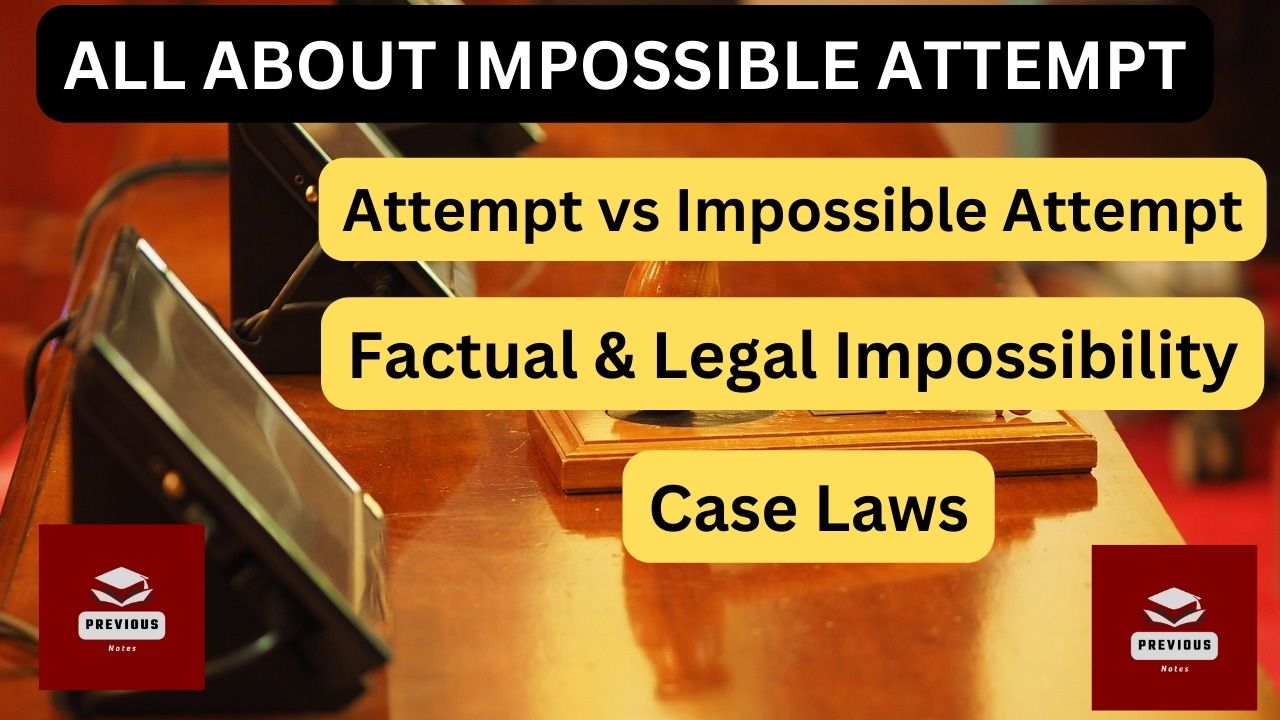Impossible Attempt & Attempt Definition & Examples:
ATTEMPT:
“An ‘Attempt to crime’ is when someone tries to commit a crime but fails.
“A direct movement towards the commission of a crime”.
‘Attempt’ is not defined in the Indian Penal Code. Section 511 of the IPC only dealt with punishment for attempting to commit offences.
IMPOSSIBLE ATTEMPT:
An “impossible attempt” is a concept in criminal law referring to a situation where an individual tries to commit a crime but, due to the circumstances, the completion of the crime is not possible.
Examples:
- A man takes what he thinks is another’s umbrella, but it is his own.
- A would-be pickpocket sticks his hand into an empty pocket.
- A man shoots at a peephole, thinking there is a policeman there; or he fires at a wax effigy, thinking that it is an enemy
- If a person attempts to kill someone by empty gun.
- Attempt to kill someone already dead.
- when A gives a glass of liquor blended with poison to B but the glass falls on the ground and the liquor spills over rendering it impossible for B to consume the poison.
DIFFERENCE BETWEEN IMPOSSIBLE ATTEMPT & ATTEMPT
The primary difference between an “attempt” and an “impossible attempt” in criminal law lies in the feasibility of completing the intended crime.
Attempt:
Feasibility: In a straightforward attempt, the crime could have been completed if circumstances had been different. For example, a person tries to rob a bank but is caught by the police before taking any money.
Impossible Attempt:
Feasibility: The crime could not have been completed under any circumstances present during the attempt. There are two subcategories:
- Factual Impossibility: The crime cannot be completed due to some factual error or misunderstanding (e.g., attempting to steal from an empty safe).
- Legal Impossibility: The intended acts do not constitute a crime (e.g., attempting to smuggle a substance that is not illegal).
Factual Impossibility and Legal Impossibility:
Factual Impossibility: The one wherein the defendant fails because of the factual or physical condition unknown to the defendant.
Example:
- A would-be pickpocket sticks his hand into an empty pocket.
- Attempted abortion though the woman was not pregnant.
- Attempted shooting of someone with an empty gun.
- Attempted rape by an impotent defendant.’
Legal Impossibility: A legally impossible attempt is one in which the act when fully consummated does not meet the legal requirements of the intended crime. An attempt which lacks legal requirement to constitute a crime.
This happens when the actions the person intends to carry out are not actually illegal, even if the person believes they are committing a crime.
Example:
- Stealing one’s own umbrella.
- To receive goods believed to be stolen when in fact they were not.
- If someone believes it is illegal to import a certain type of fruit and attempts to do so, but it turns out that importing the fruit is perfectly legal, this would be a legal impossibility.
Punishment of Impossible Attempts:
Earlier Approach:
Earlier the law regarding the impossible attempt was that it would be no crime if a person attempting to do something, which in fact was not possible to perform, it was treated as mere preparation and no punishment was provided for that.
Case Laws:
- Q v. Collins: It was held that if a pickpocket puts his hand in someone’s pocket with the intention to steal but finds the pocket empty, he would not be liable for an attempt to commit theft, the same approach was adopted in R. v. McPherson D. And B. 197 and R v. Dodd case.
New Approach: the accused was convicted for an attempt to steal from a woman’s coat although the coat was empty, the earlier approach is reversed now.
Case Laws:
R v. Brown & R. v. Ring: Rowlett J, remarked that there is absolutely no linkage between impossibility of actual commission of an offence and a possible attempt made in furtherance of an intention to commit the offence, the accused was held liable for attempt to steal from a woman’s coat though the coat was empty.
You May Also Like:
You May Also Like:
Euthanasia in India, Right to die with Dignity
Right to Privacy Case Law Mr. X vs. Hospital Z
Federal Constitution Definition and key points
University of Madras vs. Shantabai,1954: Article 12 Case Law
Article 20 Fundamental Right with Case Laws
Article 19 Fundamental Right of Indian Constitution with 10 Case Laws
Article 358, 359 Fundamental rights during emergency
Parliamentary Privileges and Fundamental Rights with Case Laws
Article 14 Fundamental Right with Case Laws
Article 15 Fundamental Right with Case Laws
Article 12 Fundamental Right with Case Laws
DOMESTIC VIOLENCE AS TORT | APPLICATION OF TORT LAW
Crimes without Mens Rea? Statute without Mens Rea.
Definition of crime by various jurists, Criminology
Methods of Studying Criminology
All about Capital Punishment with Case Laws
Forms of Judicial Process: Adversarial & Inquisitorial
DOMESTIC VIOLENCE AS TORT | APPLICATION OF TORT LAW
Economic Tort | Business Tort: Application of Tort Law
Crimes without Mens Rea? Statute without Mens Rea.
Specific Principles of Criminal Law | LLM Previous Year Paper 2024 | CCSU
Specific Torts | LLM 4th Semester Previous Year Paper 2024 | CCSU
History and Basic Principles of Criminal Law | Previous Paper 2023
LLM Previous Year Paper 2023 | PRIVILEGED CLASS DEVIANCE


















Leave a Reply